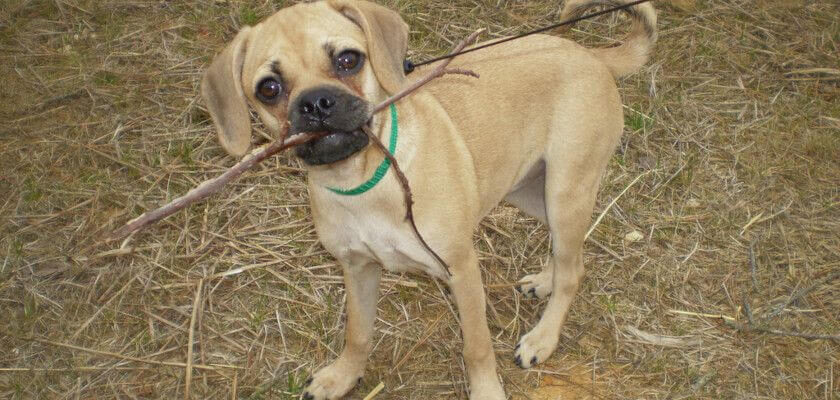Appearence
Muggins are typically a mix of black and fawn, with a few exceptions. They have the signature Pug face with big eyes and a short muzzle. Their Miniature Pinscher heritage gives them their characteristic pointy ears, although these may droop as the dog gets older. They often have some white markings on their chest, paws, and face. Muggins typically weigh between 13 and 18 pounds, with males being on the larger end of the scale. They stand between 11 and 14 inches tall at the shoulder.
Personality
The Muggin is a friendly dog that gets along well with people and other animals. They are playful and energetic, but they also enjoy cuddling and relaxing. They are intelligent dogs that are easy to train. Muggins are generally good watchdogs, although they may bark more than some people would like.
Health
Like all designer breeds, they can be prone to the same health problems they parent breeds suffer from. Some of the conditions that may affect Muggins include nerve degeneration, hypothyroidism, and megaesophagus.
Degenerative Myelopathy
Muggin dogs are prone to a type of nerve degeneration that can cause them to lose function in their hind legs. The condition, called degenerative myelopathy, is thought to be caused by a virus or autoimmune response. Dogs with the condition will gradually lose the use of their back legs, eventually becoming unable to walk at all. There is no cure for degenerative myelopathy, but dogs can be given supportive care to help them stay comfortable and mobile for as long as possible.
Hyphotiroidism
This condition results when the dog’s thyroid gland doesn’t produce enough thyroid hormone due to a defect in the gland, a problem with the pituitary gland that controls the thyroid, or damage to the hypothalamus, which helps regulate many body processes. The most common symptoms of hypothyroidism in dogs are weight gain, hair loss, and a poor coat. Other symptoms can include lethargy, muscle weakness, and seizures. Treatment for hypothyroidism usually involves lifelong medication with synthetic thyroid hormone.
Megaesophagus
This is a condition in which the esophagus becomes enlarged and weakened. This can cause difficulty swallowing, which can lead to food or water becoming trapped in the esophagus. This can cause the dog to regurgitate (throw up), choke, or even die. Megaesophagus is most commonly seen in young dogs, but can occur in dogs of any age.
Care
1. Feed them a high-quality diet. Like all dogs, muggin need a diet that is high in protein and low in fat.
2. Exercise them regularly. Muggin need at least 30 minutes of exercise each day. A good way to exercise them is with a long walk or a game of fetch.
3. Brush their coat regularly. Muggin have a short, smooth coat that should be brushed at least once a week.
4. Groom them regularly. Muggin also need to be groomed regularly, especially if they have a longer coat. This means brushing their teeth, trimming their nails, and checking their ears for infection.
Cost
The average price for a Muggin dog is between $200 and $500, which is much cheaper than most other breeds. This makes them a great option for families on a budget, or for those who want a high-quality pet but don’t want to spend a lot of money.
History
The Muggin is a new breed, dating back to only the early 2000s in the United States. They were developed by crossing a Miniature Pinscher with a Pug, and the breed has been growing in popularity ever since. The Muggin is not yet recognized by the American Kennel Club, but it is gaining recognition from other kennel clubs around the world.
Miniature Pinscher
The Miniature Pinscher is a small dog that was originally bred in Germany to hunt rats. He is the smallest of the Pinscher breeds, and he has a very distinctive appearance with his pointy ears and short muzzle. The Miniature Pinscher is an active and playful dog who loves to play fetch or tug-of-war. He is also very intelligent and easy to train.
Pug
The Pug is an old royal breed that originated in China. They were brought to Europe in the 16th century and became popular there. They are a small, stocky dog with a wrinkled face and curled tail. They have a short coat that can be any color but black. Pugs are known for their friendly personality and clownish behavior. They do not like hot weather because of their short muzzle, which causes them difficulty breathing.
Image source: Mtony75 @ Wikipedia, CC BY-SA 3.0
Similar Posts:
- The German Pinscher Dog Breed: The Ultimate Guide to German Pinschers and Their Breed Characteristics According to AKC
- Chipin – An Urban Watchdog and a Loyal Friend
- The Complete Guide to the Miniature Bulldog, a Cross of English Bulldogs and Pugs. Breed Information on the Bulldog Mix
- Meet the Playful and Alert Dog: Miniature Schnauzer Dog Breed Information
- What You Get From a Great Dane and a Doberman Pinscher. Everything You Need to Know About the Doberdane Dog Mixed Breed
- Doberman Shepherd – German Shepherd And A Doberman Mix
- Meet The Miniature Dachshund (Mini Dachshund): A Dog Breed With High Exercise Needs
- Miniature Boxer – A Good Apartment Dog for Families

